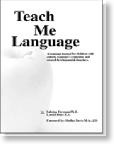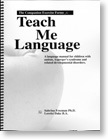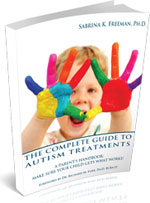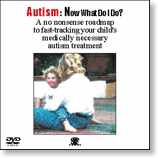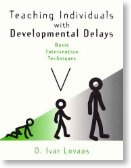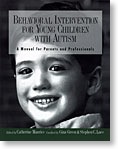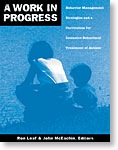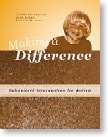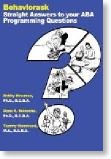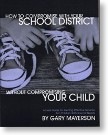Will my kid EVER talk?
16/11/11 08:56 Filed in: autism | Asperger's Syndrome
One of the first questions that parents of newly diagnosed children often ask is: will my child ever speak? No professional really wants to touch that question with a ten foot pole because the answer is: it depends. I like to share what I’ve learn over 20 years of reading about this topic in the academic literature, speaking to thousands of parents of children with autism, and personally observing several dozen children with autism in behavioral treatment programs. I need to preface my opinions in this post by saying that I’m talking about children with autism, not Asperger’s syndrome (children with Asperger’s syndrome need to work on language as well; however, they have a much easier time improving their language abilities than children with autism).
Echolalia (including Delayed Echolalia)
If your child cannot use language to communicate but is able to repeat things people say, or can sing songs and actually pronounce words or the lyrics of a song, you should be very happy! With much hard work, and a qualified Behavioral Consultant and/a Behavioral Speech and Language Pathologist (SLP) your child will likely gain the ability to use language functionally. The child’s ability to use language will be highly dependent on the amount of time devoted to communication (and a once a week, one hour treatment session is generally not sufficient). Speech and language must be incorporated into an intensive program designed by a qualified Behavioral Treatment Consultant. If you have only recently established an intensive program for your child, at this point the full potential of your child is impossible to predict. After a few years of treatment, it will become much clearer to you, and the professionals in your orbit, regarding how fluent your child may become in future. So, my advice is not to inherit the future prematurely. Concentrate on maintaining a great treatment program with a heavy emphasis on speech and language!
Apraxia
There is a small subset of children with autism who also suffer from Apraxia, which is a difficulty in actually creating the verbal utterances required to speak. Apraxia occurs in children with and without autism. If a child with autism is Apraxic, the child will need a behavioral Speech and Language Pathologist to work with the child to teach how to create the individual sounds that comprise letters and words. This work should be part of an intensive program, where the SLP is a consultant to a team of behavioral therapists who practice the exercises designed and introduced by the SLP. There is controversy in the literature regarding the rare incidence of Apraxia amongst children afflicted with autism; however, if it is your child suffering from both, the prevalence of Apraxia in autism is irrelevant to you.
Aphasia
There is a subset of children with autism who also suffer from Aphasia: they cannot remember words, even after they are taught. A good behavioral SLP will be able to diagnose whether the child with autism also suffers from this syndrome. Although not common in children with autism, it is important to know whether the child suffers from Aphasia because the SLP, Behavioral Consultant and parent are going to have to agree on a strategy to attack the child’s communication difficulties. The challenge to create meaningful language is greater when Aphasia is added to the mix; however, working intensively on language is still crucially important for the child.
One very promising piece of research that was published by Smith et al. 1997, demonstrates that even the most severely affected children with autism can gain enough language to speak in words, label objects and express needs orally. Whether the children in this study suffered from Apraxia or Aphasia is less clear; however, these were children who had NO speech whatsoever at intake.
Echolalia (including Delayed Echolalia)
If your child cannot use language to communicate but is able to repeat things people say, or can sing songs and actually pronounce words or the lyrics of a song, you should be very happy! With much hard work, and a qualified Behavioral Consultant and/a Behavioral Speech and Language Pathologist (SLP) your child will likely gain the ability to use language functionally. The child’s ability to use language will be highly dependent on the amount of time devoted to communication (and a once a week, one hour treatment session is generally not sufficient). Speech and language must be incorporated into an intensive program designed by a qualified Behavioral Treatment Consultant. If you have only recently established an intensive program for your child, at this point the full potential of your child is impossible to predict. After a few years of treatment, it will become much clearer to you, and the professionals in your orbit, regarding how fluent your child may become in future. So, my advice is not to inherit the future prematurely. Concentrate on maintaining a great treatment program with a heavy emphasis on speech and language!
Apraxia
There is a small subset of children with autism who also suffer from Apraxia, which is a difficulty in actually creating the verbal utterances required to speak. Apraxia occurs in children with and without autism. If a child with autism is Apraxic, the child will need a behavioral Speech and Language Pathologist to work with the child to teach how to create the individual sounds that comprise letters and words. This work should be part of an intensive program, where the SLP is a consultant to a team of behavioral therapists who practice the exercises designed and introduced by the SLP. There is controversy in the literature regarding the rare incidence of Apraxia amongst children afflicted with autism; however, if it is your child suffering from both, the prevalence of Apraxia in autism is irrelevant to you.
Aphasia
There is a subset of children with autism who also suffer from Aphasia: they cannot remember words, even after they are taught. A good behavioral SLP will be able to diagnose whether the child with autism also suffers from this syndrome. Although not common in children with autism, it is important to know whether the child suffers from Aphasia because the SLP, Behavioral Consultant and parent are going to have to agree on a strategy to attack the child’s communication difficulties. The challenge to create meaningful language is greater when Aphasia is added to the mix; however, working intensively on language is still crucially important for the child.
One very promising piece of research that was published by Smith et al. 1997, demonstrates that even the most severely affected children with autism can gain enough language to speak in words, label objects and express needs orally. Whether the children in this study suffered from Apraxia or Aphasia is less clear; however, these were children who had NO speech whatsoever at intake.


